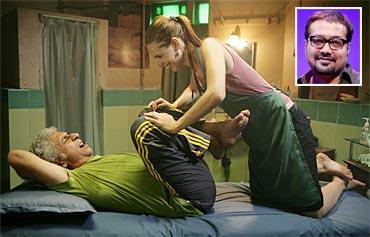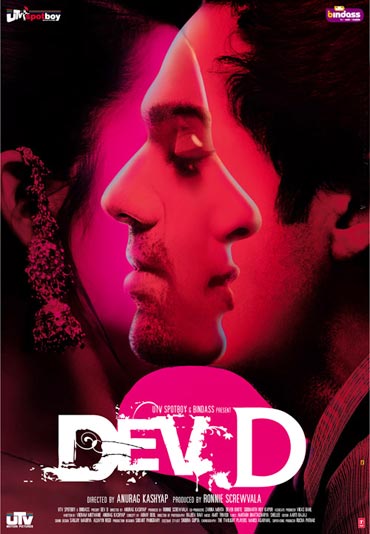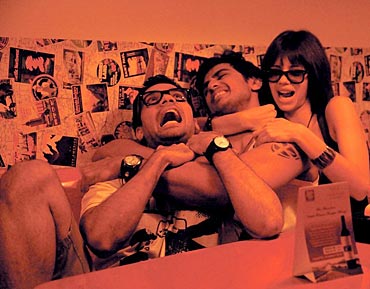Aseem Chhabra in New York
Anurag Kashyap's professional life has been well recorded in the press -- struggles to get his early films released, followed by the critical success of works like Black Friday, Dev D and Gulal. He has since produced three films -- Udaan, Shaitan and Michael, and finally released his more-than-a-year-old film That Girl In Yellow Boots last Friday.
At the New York premiere of the film a coupld of days ago, Kashyap spoke to Aseem Chhabra about his issues with film distribution, the Hindi film industry in general and his gripe with film critics.
For Kashyap's take on That Girl in Yellow Boots, click here.
You showed Yellow Boots last year at the Venice and Toronto film festivals. The film has been ready for a while, so why did you delay the release?
My films have been shown at film festivals and have had satellite releases, but have very small theatrical releases in the US. Black Friday and Dev D opened in 10 theatres for a week in the US. They were not advertised. The distributors in India insist on worldwide rights otherwise they don't take the film.
This time I sold the film abroad first (to an independent distribution house, IndiePix) and then to Viacom 18. We were looking for an Indian distributor who would collaborate with someone outside. And Viacom is the only company that came out saying that these are the areas in the non-diaspora market that we want to explore. It can only happen when two teams come together. This time I was the decision maker and I decided I'll sit on it until I explore this market.
The biggest heartbreak is a film like Udaan, which has won three audience awards at film festivals in America, and they (the film's distributor) said they didn't think it was worth releasing worldwide. They only cater to the Indian diaspora.
Even with the Indian diaspora, they didn't push it enough. There were only two prints of Udaan in the US.
Yeah, but someone has to push it without the fear that it won't work. I haven't seen any revenue from VOD. So it is better that everyone sells their own films -- digitally, online. I can sell my own music, my own ringtones. At some point all filmmakers should do that.
You said something interesting that this time you are in charge.
With Yellow Boots, yes, I was in charge. I was the producer and I decided that I will finish the film and then sell it. And for that, I had to borrow money.
'I said no to three films that went on to become blockbusters'
Image: A poster of Paanch, Kashyap's first film that has still not releasedI was looking at your career and realised you came to Mumbai a while back.
I have been here 19 years.
It took a long time to reach this place.
It took me hell of a long time. It took me 11 years since I made my first film, and 15 years since I wrote my first films.
So what does this teach you about yourself?
The idea is not to give up. If you are doing things because you believe in them, then you should continue doing that. If you are doing it for any other reason, if somebody or the world says so, then don't.
You had a sense of giving up, I am sure.
The time was when everybody told me, but by then I had left everybody.
You never doubted in your mind about what you were doing?
No, I didn't! Not once did I have a doubt that what I was doing was wrong.
How many films had you made that weren't released?
I made two films that weren't released. Two were shelved. In between I said no to three films that went on to become blockbusters.
Which were those films?
That I can't say or else it will sound like a case of sour grapes.
But why did you say no?
Because I didn't believe in them and I still do not believe in them, even though they became blockbusters. And all three films resurrected some big careers.
Do you think the work that you are doing now, the writing, does it have anything to do with the struggle phase?
I think all the producing I am doing now, and associating with the kind of people... has a lot to do with my struggle days. Whatever little weight I have, even though I am a featherweight, I put behind new talent.
'I can't remember the last film where the hero wore a pair of chappals'
Image: A scene from Dev DAnd what about your own work?
I am trying to expand myself as far as I can with every new film that I am working on. Because there is a difference between making hits and making films. Ninety per cent of people only want to make hits. I was talking to someone and I said that if only our mainstream filmmakers had more passion... But everyone just follows trends.
Now, one South Indian film has been a hit and everyone will remake South Indian films. Kuch Kuch Hota Hai worked and everybody started making NRI films. After Ghajini, Dabangg and Ready worked, everyone will jump onto that bandwagon. One guy sets it up and others follow the trend.
But Hollywood does that also. George Lucas keeps making sequel after sequel of Star Wars.
But the ratio of new things that one discovers there is missing in India. Also, if you have to make masala then make it with a heart in it. Manmohan Desai made masala films and Salim-Javed wrote masala films for Amitabh Bachchan and we loved them. They had so much heart in them. And they reflected the real India. Characters did not dress like Americans. Today, I can't remember the last film where the hero wore a pair of chappals. You see actors playing cops wearing custom designed clothes -- all to showcase the body.
Do your films reflect any reality of India?
My films reflect the underground India, little known pockets of India that do exist. Like Paharganj in Dev D or the massage parlour in Yellow Boots, the royal underworld of Gulal. There are people and societies that exist but aren't very well known. My films are about the subcultures.
'No Smoking was a baby that wasn't allowed to walk'
Image: A scene from No SmokingHow do feel about No Smoking after all these years?
I think No Smoking had a universal subject, but only people from the outer universe understood it. But I love that film.
But of course you will love every film, every child of yours.
No, I love No Smoking the most. It was a baby that wasn't allowed to walk. It was that baby that I love the most.
Have you understood No Smoking more over time?
I know No Smoking. I feel like I could have translated it a little bit more. There were two sequences -- had I been given the liberty to shoot them differently, I think the film would have been more accessible.
You have to understand none of my films had been released when I started working on No Smoking. I started shooting the film in a lot of anger. I was defying the system. No Smoking was that affair where we went to first base, second base, third base, but we didn't enjoy the sex! Or, rather, sex didn't happen.
Having travelled this road, films getting banned, not getting released in time, etc. what would you recommend to people to do differently?
They should just do their own thing. When they try to do different things, is where they get f*****! The more they do their own thing, the more they will do things that are personal.
But you did your own thing and then perhaps the country was not ready for it, the censor board was not ready for it.
I don't know if they still are ready for it. But I have continued to do my own thing and that is the only way I have survived so far.
'Today's film critics are also the gossip writers'
Image: A scene from ShaitanYou are making Gangs of Wasseypur, a film that many people are waiting for. Now you have a blank cheque to make the film that you want.
For one or two years, or until I make my next big No Smoking. But I think Wasseypur is a film people will be ready for. Wasseypur celebrates us.
You think the country is ready for something as dark as Yellow Boots?
I think so, but it is a test for the country and me.
I haven't seen Shaitan, but the audience accepted that.
But not on as wide a scale as they should have. You have to understand -- 80 per cent of my audience is the Torrents downloading type --the non-paying downloading kind. That way I have a huge audience.
What about the critics? They have always liked your work.
Critics have changed quite a bit, but they need to change more. Film criticism in India still has to come of age. I am talking about the mainstream film criticism. There is some serious good criticism happening in magazines. The mainstream criticism has become more conscious of new cinema, but it still has a long way to go. Most reviews are just the story of the film. They really do not have anything more to write about.
But is there really an audience in India that pays attention to film criticism?
Now they have even forced Indian Express to give stars. People only see stars.
Has there been any time when there was honest criticism of cinema?
In the beginning, yes, during Khalid Mohammed's early days or when Bikram Singh was writing. In those days critics also headed film societies. They really were hard core film lovers. Today's film critics are also the gossip writers. Outside India, that doesn't happen.






Comment
article